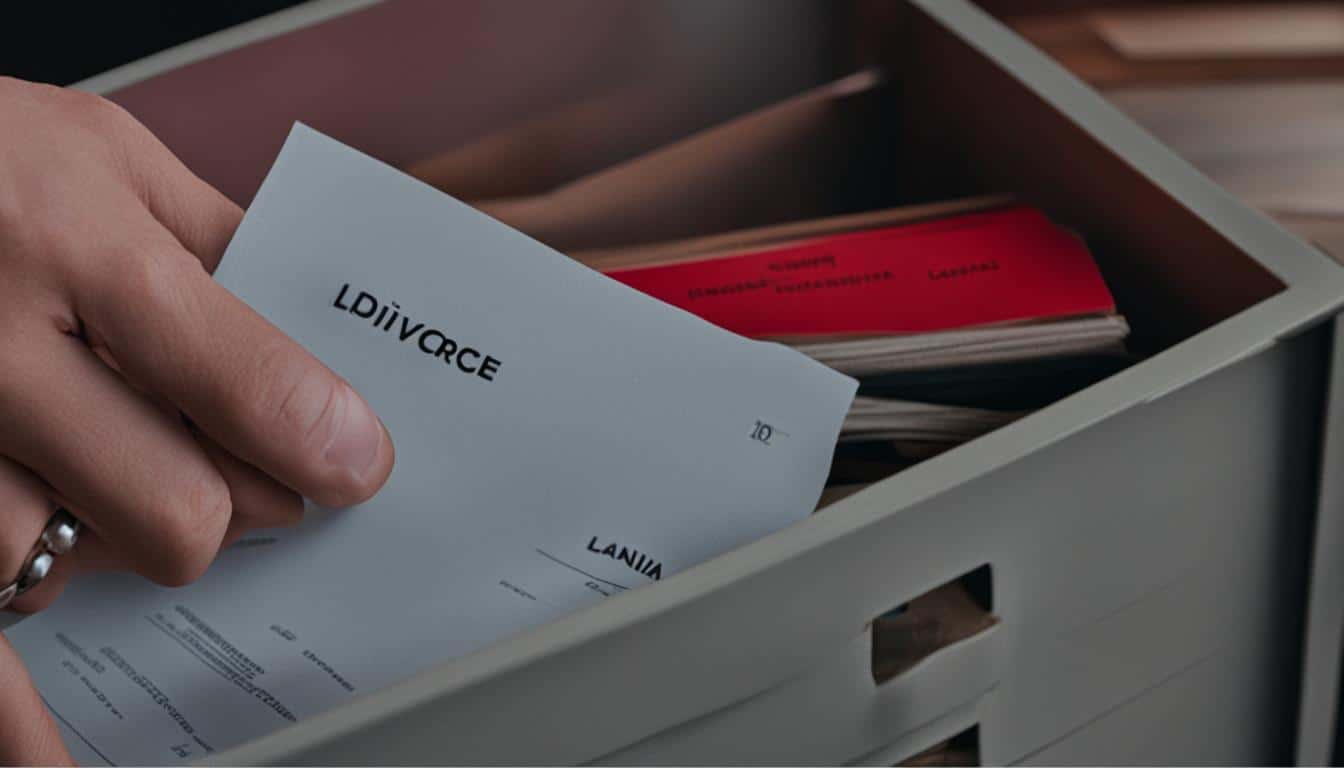Physical Address
304 North Cardinal St.
Dorchester Center, MA 02124
Physical Address
304 North Cardinal St.
Dorchester Center, MA 02124

Filing for divorce in Louisiana can feel like navigating the twists and turns of the Mississippi River — complex and full of nuances. It’s a journey that goes beyond legal procedures, touching the very core of personal change.
Louisiana’s unique divorce laws, influenced by its civil law tradition, create a distinct path with specific rules and requirements.

From residency criteria to the particularities of legal documentation, every element plays a crucial role. But this journey need not be daunting. Think of this article as your navigational chart, guiding you through the bayous of Louisiana’s divorce laws.
We’ll untangle the legal complexities and touch on the emotional aspects of this journey. Ready to embark on this path in the Pelican State?
Keep reading to learn about the essential steps for filing for divorce in Louisiana, and start your voyage towards a new chapter with clarity and confidence.
For more on how to file for divorce, check out our article, How to File for Divorce: A Concise Guide for Couples.
Filing for divorce in Louisiana requires meeting specific residency requirements. In order to file for divorce in the state, either you or your spouse must be considered “domiciled” in Louisiana. This means that Louisiana must be your primary state of residence.
To establish domicile, you must have maintained a residence in a Louisiana parish for a minimum of six months. This residency requirement ensures the divorce is filed within the appropriate jurisdiction.
The presumption of domicile in Louisiana can be countered if you can provide evidence that your domicile is actually elsewhere. This may be relevant if you or your spouse have recently moved or if you have multiple residences.
In such cases, it is advisable to consult with a legal professional to navigate the complexities of establishing domicile for divorce filing purposes.
| Residency Requirement | Description |
|---|---|
| Domicile | Either you or your spouse must be considered “domiciled” in Louisiana, meaning that Louisiana is your primary state of residence. |
| Minimum Six Months | You must have maintained a residence in a Louisiana parish for at least six months to meet the residency requirement for filing divorce. |
| Presumption of Domicile | If you or your spouse have recently moved or have multiple residences, the presumption of domicile in Louisiana can be countered with evidence of another domicile. |
Meeting the residency requirements is crucial when filing for divorce in Louisiana. It ensures that the divorce is filed within the appropriate jurisdiction and helps streamline the legal process.
Next, we’ll explore the grounds for divorce in Louisiana, which will further guide you in understanding the divorce process in the state.
In Louisiana, there are both no-fault and fault-based grounds for divorce. Understanding these grounds is essential when filing for divorce.
Under Louisiana law, a no-fault divorce can be filed under Article 102 or Article 103.
Article 102 applies when the spouses have lived separate and apart continuously for the required time period, typically 180 days if there are no minor children and 365 days if there are minor children involved.
Article 103, on the other hand, applies when the spouses have entered into a written agreement to live separate and apart, which does not require a specific time period of separation.
Alternatively, spouses can choose to file for divorce based on fault. Common fault-based grounds for divorce in Louisiana include adultery, felony conviction with imprisonment, physical or sexual abuse, and the issuance of a protective order or injunction. These grounds require providing evidence to support the claim of fault.
You should consult with a lawyer to determine the most appropriate grounds for divorce in your situation and to ensure that all necessary documentation and evidence are provided when filing.
Before filing for divorce in Louisiana, you’ll need to take certain steps to ensure you are prepared for the process ahead.
First, gather all relevant documents, such as your marriage certificate, property records, and financial statements. These documents will be necessary when filing for divorce and determining the division of assets and debts. Having them ready will help expedite the process.
You’ll also want to consider the emotional implications of divorce. Ending a marriage can be a difficult and stressful experience, so it’s important to seek support from friends, family, or a therapist.
They can provide guidance and help you navigate the emotional challenges that may arise during this time.
When preparing for divorce, gather the following documents:
Divorce can take a toll on your emotional well-being. Consider seeking support from:
Divorce can also have significant financial implications. It’s important to:
By preparing yourself emotionally and financially, you can navigate the divorce process more smoothly and ensure a better outcome for yourself.
Once you have gathered all the necessary documents and information, the next step in filing for divorce in Louisiana is preparing the required forms.
These forms serve as the official documentation of your divorce case and will be filed with the court. Complete these forms accurately to ensure a smooth and efficient filing process.
The main form you will need to prepare is the Petition for Divorce, which outlines the details of your case, including the grounds for divorce, division of assets and debts, child custody, and spousal support, if applicable.
Additionally, you may need to complete other supporting documents, such as a marital settlement agreement.
To obtain the necessary forms, you can visit the Louisiana State Bar Association‘s website or the Law Library of Louisiana. These resources provide access to standardized forms that are recognized by the courts.
| Forms | Description |
|---|---|
| Petition for Divorce | Official document outlining the details of your divorce case |
| Marital Settlement Agreement | Document specifying the division of assets, debts, child custody, and spousal support |
| Other Supporting Documents | Additional forms that may be required depending on your specific case |
When completing the forms, make sure to provide accurate and truthful information. Double-check all the details before submitting them to the court.
It may be helpful to consult with an attorney or seek legal advice to ensure that you understand the implications of the information you provide on the forms. By preparing the forms accurately and diligently, you can help ensure a smooth filing process for your divorce case.

Once you have completed all the necessary divorce forms, it’s time to file them with the appropriate court in Louisiana.
You should file in the Judicial District Court in the parish where either you or your spouse currently reside, or where you last resided as a married couple. Filing in the correct court is crucial to ensure your case proceeds smoothly.
To find the specific court where you should file for divorce, you can refer to the Map of Judicial Districts provided by the Louisiana Supreme Court. This map will help you determine the court that has jurisdiction over your case.
Remember, filing in the wrong court can lead to delays and complications in the divorce process. Make sure to check the map and verify the correct location before submitting your documents.
Once you have gathered all the necessary documents for your divorce, it’s time to fill out the required forms. These forms contain important information about your marriage, grounds for divorce, property and debt division, and child custody if applicable.
To ensure you complete the forms correctly, carefully review the instructions provided with each form. Pay attention to any specific requirements or formatting guidelines, such as using black ink or writing in uppercase letters.
Take your time to fill out each field accurately, double-checking for any mistakes or omissions.
Remember to include all necessary supporting documentation with your forms. This may include copies of marriage certificates, property records, financial statements, and any other relevant paperwork.
Organize your documents in a logical order and attach them securely to the appropriate forms.
| Common Divorce Forms in Louisiana | Related Information |
|---|---|
| Petition for Divorce | A document that formally initiates the divorce process, stating the grounds for divorce and the relief sought. |
| Marital Settlement Agreement | A written agreement between spouses that outlines the division of property, debts, and other matters. |
| Child Custody and Visitation Forms | Forms to establish child custody, visitation schedules, and child support obligations if applicable. |
| Financial Affidavit | A document that provides a detailed overview of the parties’ financial situation, including income, assets, and debts. |

Once you have completed the necessary divorce forms, you will need to file them with the court in the designated parish.
This involves submitting the original forms, along with any required copies and filing fees. Each parish may have different filing fees, so check with the clerk of court for the exact amount.
When filing the forms, ensure that they are properly organized and labeled. This can help streamline the process and prevent any confusion or delays. You may also need to provide additional supporting documents, such as proof of residency or financial disclosures.
| Parish | Filing Fee |
|---|---|
| Orleans | $400 |
| Jefferson | $350 |
| East Baton Rouge | $300 |
| Caddo | $250 |
| Lafayette | $200 |
After filing the forms, the court will assign a case number and provide you with a copy of the filed documents. Keep this copy in a safe place, as you may need it for future reference or proceedings.
Once you have filed the necessary divorce papers in Louisiana, the next step is to ensure that your spouse is properly served with copies of the filed documents. Serving papers can be done through various methods depending on the circumstances.
If your spouse resides within the state, you can opt to have the sheriff’s office serve the papers on your behalf. They will deliver the documents directly to your spouse and provide proof of service. Keep in mind that there is usually a fee associated with this service.
Alternatively, if your spouse resides outside of Louisiana, you can use certified mail to send the divorce papers. This method requires a return receipt to verify that your spouse has received the documents.
In some cases, your spouse may choose to waive service by signing an Acceptance of Service and Waiver of Citation form. By doing so, they acknowledge receipt of the divorce papers and agree to cooperate with the proceedings.
It is recommended to consult with an attorney or refer to the Louisiana State Bar Association’s guidelines for specific instructions on how to serve divorce papers in your situation.
| Serving Papers Methods | Instructions |
|---|---|
| Sheriff’s Office | Contact the sheriff’s office in the parish where your spouse resides and request their assistance in serving the divorce papers. Be prepared to pay the associated fee and provide the necessary documents. |
| Certified Mail | Send the divorce papers to your spouse’s out-of-state address via certified mail. Request a return receipt to confirm delivery and keep the receipt for your records. |
| Acceptance of Service and Waiver of Citation | Discuss the option of waiving service with your spouse and present them with the Acceptance of Service and Waiver of Citation form. If they agree, have them sign the form and keep a copy for your records. |
Once you have been served with the divorce petition, you’ll need to respond in a timely manner.
In Louisiana, you generally have 15 days from the date of service to file your response with the court.
This response indicates your agreement or disagreement with the terms outlined in the petition. Carefully read through the petition and consult with an attorney if necessary to fully understand your rights and options.
When preparing your response, clearly state whether you agree or disagree with each specific issue raised in the petition. This includes matters such as child custody, visitation, spousal support, and division of property and debts.
If you disagree with any of the proposed terms, you can provide alternative suggestions or request a hearing to further discuss these matters. Always provide accurate and detailed information to support your position.
Keep in mind that your response may also include motions regarding additional matters that need to be addressed during the divorce process. This could include requests for temporary child custody or support, protection orders, or any other relevant issues.

As part of the divorce process, you have to provide full financial disclosures to ensure a fair division of property and determination of financial support obligations. Both parties involved in the divorce will typically be required to provide documentation of their income, assets, debts, and expenses.
Financial disclosures play a significant role in helping the court make informed decisions about property division, alimony, and child support. By providing accurate and thorough financial documentation, you can ensure that your financial rights and interests are protected.
Here is a breakdown of the types of financial information that may be required:
By being thorough and transparent in your financial disclosures, you can help streamline the divorce process and ensure a fair resolution. Consult with your attorney or seek professional advice to ensure that you provide all the required financial documentation accurately.
| Financial Category | Examples |
|---|---|
| Income | Pay stubs, tax returns, business income statements |
| Assets | Bank statements, property deeds, investment account statements |
| Debts | Mortgage statements, loan agreements, credit card statements |
| Expenses | Bills, receipts, monthly budget |
If you’re considering filing for divorce in Louisiana without an attorney, there are resources available to help you navigate the process.
While it’s generally recommended to seek legal advice, a DIY divorce can be a viable option for those who have a good understanding of the requirements and are willing to put in the effort.
Before proceeding, familiarize yourself with the eligibility criteria and grounds for divorce in Louisiana. Make sure you meet the residency requirements and understand the different categories of fault-based and no-fault grounds for divorce. This knowledge will help you determine the appropriate course of action for your situation.
Preparing accurate divorce forms is crucial when filing without an attorney. Online resources and services can assist you in completing the necessary paperwork, such as the Petition for Divorce and marital settlement agreement. Be diligent in providing honest and detailed information to avoid complications or delays in the filing process.
Remember, filing for divorce without an attorney requires careful attention to detail. While it can save costs, it’s essential to understand the complexities involved. If you encounter any challenges or uncertainties, it’s advisable to seek legal counsel to ensure your rights and interests are protected throughout the divorce proceedings.
To see how this process of filing for divorce in Louisiana compares to that in other states, check out our articles about how to file for divorce in Alabama and filing for divorce in Arkansas.
Either you or your spouse must be considered “domiciled” in Louisiana, meaning it must be your primary state of residence. You must have maintained a residence in a Louisiana parish for at least six months.
Louisiana allows both no-fault and fault-based divorces. No-fault divorces can be filed under Article 102 or Article 103, depending on whether the spouses have been living separately before filing. Fault-based grounds include adultery, felony conviction with imprisonment, physical or sexual abuse, and issuance of a protective order or injunction.
It is important to gather all necessary documents, such as marriage certificates, property records, and financial statements. It is also crucial to consider the emotional and financial implications of divorce and seek support from friends, family, or a therapist if needed.
To file for divorce in Louisiana, you will need to prepare various forms, including a Petition for Divorce, marital settlement agreement (if applicable), and other supporting documents. These forms can be obtained from the Louisiana State Bar Association’s website or the Law Library of Louisiana.
Divorce filings should be made in the Judicial District Court in the parish where either you or your spouse currently reside or where you last resided as a married couple. You can find the appropriate court by using the Map of Judicial Districts provided by the Louisiana State Bar Association.
It is essential to provide accurate and truthful information, including details about your marriage, grounds for divorce, property and debt division, child custody, and other relevant information. Take the time to carefully review the forms before submitting them to the court.
Once you have completed the necessary divorce forms, you will need to file them with the court in the designated parish. This involves submitting the original forms, along with any required copies and filing fees. Each parish may have different filing fees, so it is important to check with the clerk of court for the exact amount.
In Louisiana, you can request that the sheriff’s office serve the papers for a fee, or you can serve them by certified mail if your spouse lives outside of the state. Alternatively, your spouse can waive service by signing an Acceptance of Service and Waiver of Citation form.
If you are the non-filing spouse, you will have the opportunity to respond to the divorce petition. This involves filing a response with the court, indicating your agreement or disagreement with the terms outlined in the petition. You may also have the option to file motions regarding other matters, such as spousal support and child custody.
As part of the divorce process, both parties are typically required to provide full financial disclosures. This includes providing documentation of income, assets, debts, and expenses. Accurate and thorough financial disclosures are necessary to ensure a fair division of property and determination of financial support obligations.
While it is recommended to seek legal advice when navigating the divorce process, it is possible to file for divorce without an attorney. There are online resources and services available that provide assistance with preparing and filing divorce documents. However, it is important to understand the complexities involved and to ensure that all forms are completed accurately.